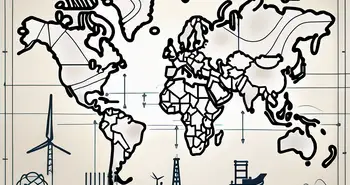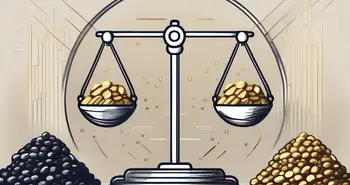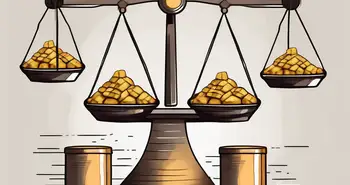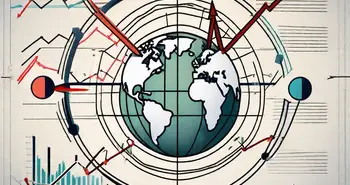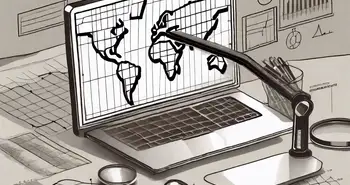An Introduction to Energy Commodity Trading
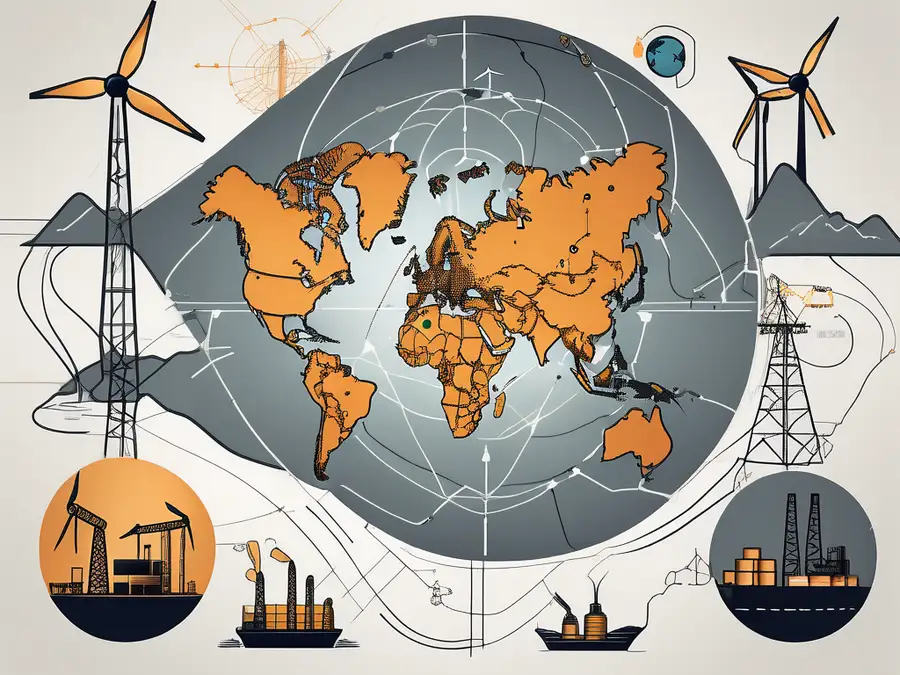
Trading energy commodities can be a complex and highly lucrative endeavor. If you're new to the world of energy commodity trading, it's important to understand the basics, types of energy commodities, the trading process, and how to manage the risks involved. In this ultimate guide, I'll provide you with all the essential information you need to begin your journey into the exciting world of energy commodity trading.
Understanding Energy Commodity Trading
Definition and Basics of Energy Commodity Trading
Energy commodity trading involves the buying and selling of various energy commodities such as oil, natural gas, coal, and uranium. These commodities serve as essential inputs for industries and play a crucial role in the global economy. Trading energy commodities allows participants to profit from price movements in these markets.
As an energy commodity trader, it's important to understand the fundamental factors driving these markets, including supply and demand dynamics, geopolitical events, and market sentiment. Keeping a close eye on these factors will help you make informed trading decisions.
Energy commodity trading is a complex and dynamic field that requires a deep understanding of not only the commodities themselves but also the broader economic and political landscape. For example, changes in government policies, technological advancements, and environmental concerns can all impact the energy markets and create trading opportunities.
Importance of Energy Commodities in the Global Market
Energy commodities are the lifeblood of modern civilization. They power industries, homes, and transportation systems around the world. Any disruption in the supply or price of energy commodities can have far-reaching consequences for both developed and emerging economies.
As an energy commodity trader, understanding the global demand for energy and the factors influencing it is crucial. By staying informed and anticipating shifts in supply and demand, you can capitalize on trading opportunities that arise.
Furthermore, the interconnected nature of energy markets means that events in one part of the world can have ripple effects across the globe. For instance, political instability in a major oil-producing region can lead to supply disruptions that impact energy prices worldwide. Being aware of these interconnected relationships is essential for successful energy commodity trading.
Types of Energy Commodities
Oil and Petroleum Products
Oil is the most widely traded energy commodity, with crude oil being the primary form. It is used for fueling vehicles, producing electricity, and manufacturing various products. Additionally, petroleum products such as gasoline, diesel, and jet fuel are derived from crude oil and have their own distinct trading markets.
When it comes to trading oil, there are several factors that can influence prices. One of the key factors impacting oil prices is OPEC (Organization of the Petroleum Exporting Countries), which controls a significant portion of global oil production. OPEC's decisions, such as adjusting production levels or implementing production cuts, can have a significant impact on oil prices. Understanding OPEC's decisions and their impact on oil prices is vital for successful trading in this market.
Furthermore, geopolitical events and conflicts in oil-producing regions can also affect oil prices. For example, tensions in the Middle East or disruptions in major oil-producing countries can lead to supply disruptions and price volatility. Traders need to stay updated on global events and geopolitical developments to make informed trading decisions.
Natural Gas
Natural gas is another crucial energy commodity, used for heating, cooking, and as a feedstock for electricity generation. Unlike oil, natural gas can be transported via pipelines or liquefied and shipped by tankers, creating different trading opportunities.
Trading natural gas requires a deep understanding of various factors. Weather patterns play a significant role in natural gas trading, as colder winters can increase demand for heating, while milder weather can lead to lower demand. Additionally, storage levels and infrastructure constraints are important considerations. Traders need to monitor storage levels to anticipate supply and demand dynamics, and infrastructure constraints to assess transportation capacities and potential bottlenecks. By carefully monitoring these factors, traders can identify potential trading opportunities and effectively manage their positions.
Coal
Coal has historically been a dominant source of energy, particularly for electricity generation. Despite increasing concerns over its environmental impact, coal still plays a significant role in the global energy mix.
When trading coal, it's important to consider various factors. Environmental regulations and policies can have a significant impact on the demand for coal. As governments and organizations push for cleaner energy sources, there may be a shift away from coal towards renewable energy. Traders need to stay informed about these regulations and policies to anticipate changes in demand and make informed trading decisions. Additionally, global demand patterns and economic trends can also influence coal prices. Monitoring economic indicators and global energy consumption can provide valuable insights for coal traders.
Uranium for Nuclear Energy
Uranium is primarily used as fuel for nuclear power plants. Trading uranium involves understanding complex factors such as nuclear energy policies, geopolitical considerations, and technological advancements in the nuclear sector.
Given the long-term nature of nuclear energy contracts and the limited number of participants in this market, trading uranium requires a high level of expertise and specialized knowledge. Traders need to closely follow nuclear energy policies and regulations, as changes in government policies can have a significant impact on the demand for uranium. Geopolitical considerations, such as international relations and nuclear proliferation concerns, can also affect uranium prices. Additionally, staying updated on technological advancements in the nuclear sector, such as advancements in reactor designs or new nuclear technologies, can provide valuable insights for uranium traders.
Overall, trading energy commodities requires a deep understanding of various factors and a continuous effort to stay informed about market dynamics. By carefully monitoring these factors and staying updated on industry developments, traders can navigate the energy markets with confidence.
The Trading Process of Energy Commodities
Spot Market Vs. Futures Market
In energy commodity trading, you have two main options: the spot market and the futures market. The spot market involves buying or selling commodities for immediate delivery and settlement, whereas the futures market involves trading contracts for future delivery.
Spot market trading provides immediate liquidity and flexibility, whereas futures market trading allows for price hedging and longer-term trading strategies. Understanding the differences between these two markets is crucial for achieving your trading goals.
Role of Energy Commodity Brokers
An energy commodity broker acts as an intermediary between buyers and sellers in the market. Their expertise and network of contacts enable them to execute trades on behalf of their clients and provide valuable market insights.
Working with a trustworthy and experienced energy commodity broker can be instrumental in gaining access to markets, analyzing market trends, and executing trades effectively. It's important to choose a broker with a strong track record and a deep understanding of the energy commodities you wish to trade.
Understanding Trading Platforms
Trading energy commodities requires access to efficient and reliable trading platforms. These platforms provide real-time market data, analytical tools, and order execution capabilities.
When selecting a trading platform, factors such as ease of use, reliability, and the availability of advanced features should be considered. It's beneficial to choose a platform that offers a seamless trading experience and allows you to monitor and manage your positions effectively.
Risk Management in Energy Commodity Trading
Price Risk and How to Manage It
Price volatility is inherent in energy commodity markets. Understanding and managing price risk is essential for successful trading.
One common risk management strategy is hedging, which involves taking opposite positions in the futures market to offset potential losses from your physical energy commodity positions. By hedging, you can protect yourself from adverse price movements and reduce your overall exposure to market fluctuations.
Regulatory Risks in Energy Commodity Trading
Energy commodity trading is subject to various regulatory frameworks and oversight. Compliance with these regulations is crucial to avoid legal issues and protect your trading activities.
Staying updated on regulatory developments and maintaining transparent and ethical trading practices will help you navigate the regulatory landscape effectively.
Strategies for Risk Mitigation
Implementing risk management strategies is vital for minimizing potential losses and protecting your trading capital.
Diversification is a widely used strategy that involves spreading your investments across different energy commodities, regions, and trading strategies. By diversifying your portfolio, you can reduce the impact of adverse market movements on your overall trading performance.
Personal Expert Advice
Having traded energy commodities for over a decade, I've learned that success in this field requires a deep understanding of market dynamics, continuous learning, and disciplined risk management.
One piece of advice I would offer to aspiring energy commodity traders is to never stop educating yourself. Stay updated on industry news, market trends, and technological advancements that can impact the energy commodity markets. Additionally, develop a trading plan and stick to it, while remaining flexible enough to adapt to changing market conditions.
FAQ
Q: What are energy commodities?
A: Energy commodities include oil, natural gas, coal, and uranium, which are essential inputs for various industries and play a vital role in the global economy.
Q: What factors affect energy commodity prices?
A: Energy commodity prices are influenced by supply and demand dynamics, geopolitical events, weather patterns, environmental regulations, and technological advancements.
Q: What is the difference between the spot market and the futures market?
A: The spot market involves immediate buying or selling of commodities, while the futures market involves trading contracts for future delivery.
Q: How can I manage the risks involved in energy commodity trading?
A: Risk management strategies include hedging, diversification, staying updated on regulatory requirements, and maintaining transparent and ethical trading practices.
By following this ultimate guide and applying the knowledge gained, you'll be well-equipped to embark on your energy commodity trading journey. Remember, success in this field requires expertise, continuous learning, and disciplined risk management. Best of luck in your trading endeavors!
Ready to take control of your energy commodity trading journey with cutting-edge technology? Look no further than Morpher, the revolutionary trading platform that empowers you with zero fees, infinite liquidity, and the ability to trade with fractional shares. Whether you're looking to profit from market downturns through short selling or amplify your trades with up to 10x leverage, Morpher offers a unique trading experience on the Ethereum Blockchain. Embrace the future of trading with the safety and control of the Morpher Wallet. Sign Up and Get Your Free Sign Up Bonus today, and join the global community of traders who are already transforming the way they invest.

Disclaimer: All investments involve risk, and the past performance of a security, industry, sector, market, financial product, trading strategy, or individual’s trading does not guarantee future results or returns. Investors are fully responsible for any investment decisions they make. Such decisions should be based solely on an evaluation of their financial circumstances, investment objectives, risk tolerance, and liquidity needs. This post does not constitute investment advice.

Painless trading for everyone
Hundreds of markets all in one place - Apple, Bitcoin, Gold, Watches, NFTs, Sneakers and so much more.

Painless trading for everyone
Hundreds of markets all in one place - Apple, Bitcoin, Gold, Watches, NFTs, Sneakers and so much more.

